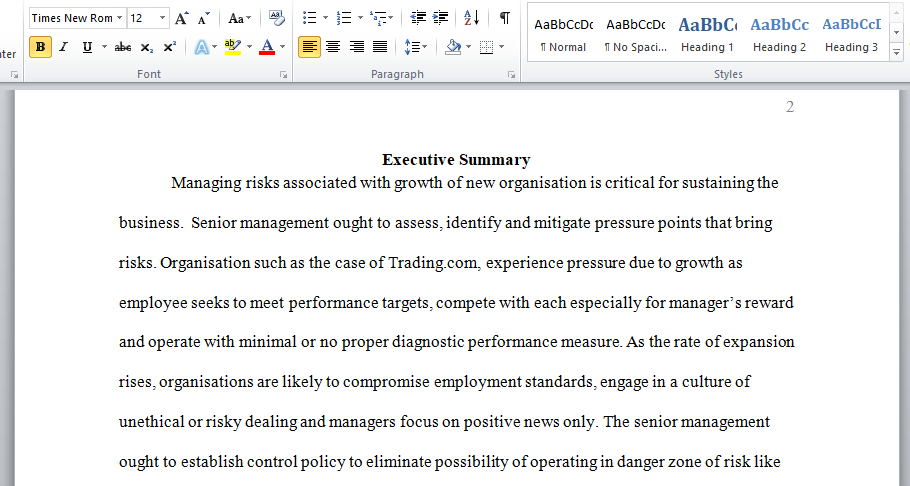Discuss Governance Ethics and Sustainability
Discuss Governance Ethics and Sustainability.Trading.com is a company that offers ordinary people share investment courses and ongoing mentoring services. The philosophy at Trading.com is that anybody can become a successful share investor if they have the right mind set, education,
and support.
The company was established three years ago by successful share trader JospeDrake. He has grown Trading.com into a medium sized business employing over100 staff with offices in Sydney, Melbourne, Brisbane, and Adelaide. One year ago the company’s course sales increased dramatically and now its operations are expanding faster than the company’s capacity to hire and induct new staff.
Jospe considers this to be a great problem to have and continues to hold the staff accountable for delivering strong financial performance.
But the company’s regional managers are not as thrilled as Jospe with the organisation’s surge in growth. The rapidly increasing need for more consultants has forced the company to lower their employment standards, hiring many new people with little to no previous experience in sales.
Business Model Trading.com generates leads by advertising free introductory webinars that explain how share investment can be used as a vehicle for achieving an early retirement. Webinar attendees are contacted after the introductory webinar by a consultant who invites them to a free face-to-face consultation. At this meeting the consultant attempts to sell the potential new client a share investment course priced at $10,000.
The consultants are managed by regional managers in each city. The regional managers report to a senior management team that includes Jospe as the company CEO.
Consultants
Consultants are given aggressive sales targets that are set by the senior management team with little or no input from either the consultants themselves or the regional managers. Until recently, the consultants were paid solely on a commission basis, that is, they earned a percentage of the $10,000 course fee for each client that they signed up. Jospe recognised this remuneration structure was placing financial pressure on many consultants and so implemented a base salary of $30,000 per annum.
Each month the consultants are ranked by the regional managers according to their sales performance. The highest performing consultants receive special bonuses such as expensive gifts and luxury holidays. Because the consultants are pitted against each other like this, the company culture is highly competitive to the point of ruthlessness.
Regional Managers
Regional managers act without a sense of the larger corporate strategy. There are no well-defined information channels for sharing information either between themselves or with senior management. The regional managers have also surrounded themselves with “yes” men and women, and do not hear much, if any, bad news. They tend to leave the consultants alone because they do not understand the sometimes complex language of the consultation process. Managers have limited access to performance data and spend much of their time trying to resolve flare ups or unanticipated emergencies. From the information they can access they tend to focus solely on course sales figures and their monthly performance reports to
senior management are often late or not submitted at all
Senior Management Team
A high percentage of Trading.com’s business is based on new courses. The courses are developed by Jospe and the senior management team: a
creative, risk taking group of share investors. In this regard they do not act like a team but are given a great deal of autonomy and so develop course content independently of each other, only returning to the group once they have created something of substantial value. There is an increasing frequency in the failure of new courses.
Answer preview:

Words:2662
